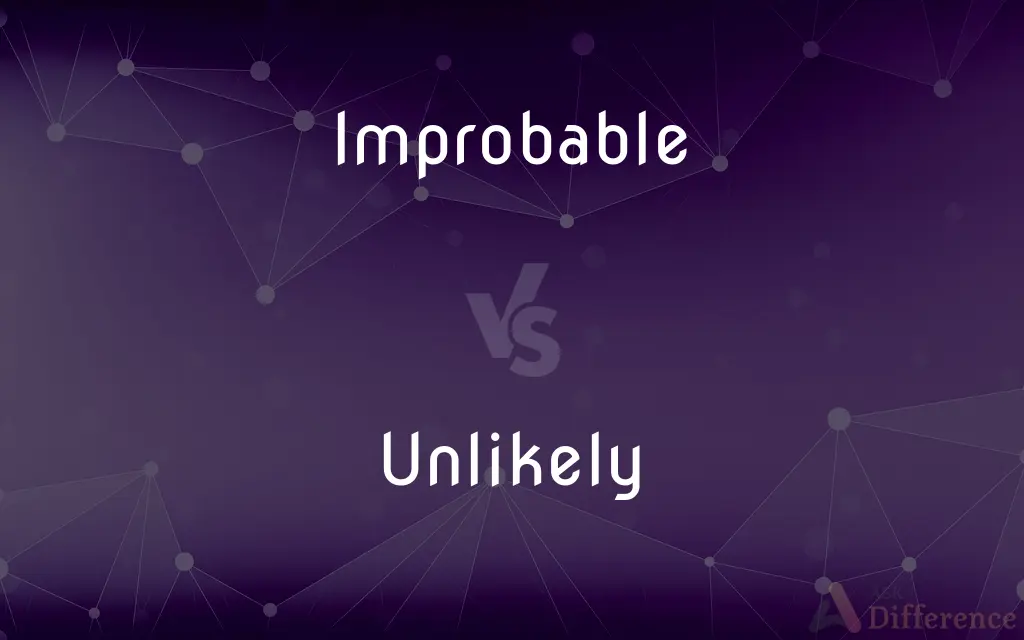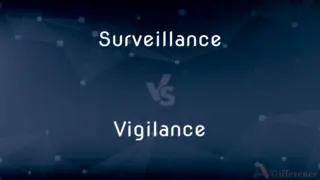Improbable vs. Unlikely — What's the Difference?
By Tayyaba Rehman & Urooj Arif — Updated on April 3, 2024
Improbable suggests a very low probability of occurrence, while unlikely refers to something not expected to happen but is less emphatic than improbable.

Difference Between Improbable and Unlikely
Table of Contents
ADVERTISEMENT
Key Differences
Improbable is used to describe situations or events that have a very low chance of happening, indicating a higher degree of skepticism or doubt. For instance, winning the lottery is often considered improbable due to the extremely low odds. On the other hand, unlikely is used for situations that are not expected to happen but seem more possible than improbable scenarios. An example might be unexpectedly running into an acquaintance in a large city—it's unlikely, but not as far-fetched as winning the lottery.
When discussing predictions or future events, the term improbable suggests a stronger sense of disbelief or a greater departure from what is considered possible. This can be applied to scientific theories, outcomes of experiments, or events in narrative fiction that are beyond the realms of the current understanding or expectations. Unlikely, however, implies that, while the event or outcome is not what one would bet on, it remains within the realm of possibility. It's often used in more mundane, everyday contexts.
In literature and storytelling, characters or events described as improbable are usually those that add a sense of wonder, surprise, or disbelief due to their extreme rarity or deviation from the norm. In contrast, unlikely elements might be used to introduce mild tension or intrigue, suggesting that the narrative could take a turn that's not anticipated but not entirely out of the question.
Statistically, improbable might be used in contexts where the likelihood of an event occurring is close to zero, but it's not impossible. Unlikely events have a greater chance of occurring than improbable ones but still have a low probability. For instance, in a game of chance, drawing a specific card from a well-shuffled deck could be unlikely, while guessing the exact order of the entire deck would be improbable.
In decision making and risk assessment, distinguishing between improbable and unlikely scenarios is crucial. Preparing for unlikely events is often a part of contingency planning, especially if the consequences are significant. In contrast, spending resources to prepare for improbable events is less common, as the return on such investments is expected to be minimal due to the extreme unlikelihood of those events occurring.
ADVERTISEMENT
Comparison Chart
Probability
Very low chance of occurrence.
Low but somewhat higher chance than improbable.
Connotation
Strong disbelief or skepticism.
Mild doubt or expectation of non-occurrence.
Usage in Context
Used for events with near-zero likelihood.
Used for events not expected, but more possible.
Examples
Winning a major lottery jackpot.
Running into an acquaintance in a large city.
Decision Making
Less likely to plan for due to extreme unlikelihood.
Planning for is more common as events are possible.
Compare with Definitions
Improbable
Very Low Probability.
An improbable event, like discovering an unknown planet in our solar system, captures the imagination.
Unlikely
Low Probability.
It's unlikely to rain in the desert, but not impossible.
Improbable
Skepticism.
Scientists often find themselves skeptical of improbable theories until proven otherwise.
Unlikely
Mild Surprise.
Their unlikely victory in the game was celebrated wildly.
Improbable
Extremely Rare.
It's improbable for someone to accurately predict the outcome of a complex event without insider knowledge.
Unlikely
Within the Realm of Possibility.
It's unlikely but possible to run into someone you know in a foreign country.
Improbable
Beyond Expectations.
The improbable success of the indie film surprised many critics.
Unlikely
Not Expected.
Finding a four-leaf clover is unlikely on the first try.
Improbable
Almost Impossible.
Surviving a fall from an airplane without a parachute is considered improbable.
Unlikely
Doubtful.
Given his busy schedule, it's unlikely he'll make it to the party.
Improbable
Unlikely to take place or be true.
Unlikely
Unlikely is the second album by Brazilian stoner rock band Far from Alaska, released on 4 August 2017. It was recorded in the United States, produced by Sylvia Massy and financed via a crowdfunding campaign.
Improbable
Not likely to be true.
It's highly improbable that aliens abducted you.
Unlikely
Not likely; improbable.
Improbable
Not likely to happen.
Due to the loss of power, it is improbable that we will begin on time.
Unlikely
Not promising; likely to fail.
Improbable
Not probable; unlikely to be true; not to be expected under the circumstances or in the usual course of events; as, an improbable story or event.
He . . . sent to Elutherius, then bishop of Rome, an improbable letter, as some of the contents discover.
Unlikely
Not likely; improbable; not to be reasonably expected.
It's very unlikely that you'll be able to walk perfectly after being in a cast for six months.
In the highly unlikely event of landing in water, lifejackets are stored under the seat.
Improbable
Not likely to be true or to occur or to have occurred;
Legislation on the question is highly unlikely
An improbable event
Unlikely
Not holding out a prospect of success; likely to fail; unpromising.
Unlikely means
Improbable
Having a probability to low to inspire belief
Unlikely
In an improbable manner.
Improbable
Too improbable to admit of belief;
A tall story
Unlikely
Something or somebody considered unlikely.
Unlikely
Not likely; improbable; not to be reasonably expected; as, an unlikely event; the thing you mention is very unlikely.
Unlikely
Not holding out a prospect of success; likely to fail; unpromising; as, unlikely means.
Unlikely
Not such as to inspire liking; unattractive; disagreeable.
Unlikely
In an unlikely manner.
Unlikely
Not likely to be true or to occur or to have occurred;
Legislation on the question is highly unlikely
An improbable event
Unlikely
Has little chance of being the case or coming about;
An unlikely story
An unlikely candidate for reelection
A butcher is unlikely to preach vegetarianism
Unlikely
Having a probability to low to inspire belief
Common Curiosities
What does it mean when something is described as improbable?
It means the situation or event is considered to have a very low chance of happening.
How does unlikely differ from improbable?
Unlikely refers to something not expected to happen but with a somewhat higher probability than something deemed improbable.
Can an event be both unlikely and improbable?
An event might be broadly considered unlikely, but within that category, if it's particularly far-fetched, it might specifically be described as improbable.
How can the distinction between improbable and unlikely affect decision-making?
Recognizing the distinction helps in prioritizing resources and efforts towards more likely scenarios while acknowledging the existence of less probable outcomes.
How do improbable and unlikely events influence planning?
Unlikely events are often accounted for in planning due to their potential impact, while improbable events might be deemed too rare to realistically prepare for.
Can cultural perceptions influence what is considered improbable or unlikely?
Yes, cultural and individual perceptions of risk and probability can influence whether something is seen as improbable or unlikely.
Do improbable and unlikely have the same meaning in all fields?
While the general distinction holds across fields, specific disciplines may use these terms with more precise meanings related to statistical probability or risk assessment.
Is improbable stronger than unlikely?
Yes, describing an event as improbable suggests a stronger degree of disbelief or a lower probability than describing it as unlikely.
Are improbable events impossible?
No, improbable events are not impossible; they just have a very low probability of occurring.
Can the probability of an event change from improbable to unlikely?
Yes, as more information becomes available or conditions change, the perceived probability of an event can shift from improbable to unlikely or vice versa.
Why might someone plan for an unlikely event but not an improbable one?
Planning for unlikely events can be practical if the consequences are significant, whereas the extreme rarity of improbable events makes preparation less justifiable.
How does context affect whether something is considered improbable or unlikely?
Context matters greatly; what might be improbable in one situation (like winning the lottery) might be merely unlikely in another (such as encountering a rare but known animal in its natural habitat).
Is it common for improbable events to occur?
By definition, improbable events rarely occur, which is what distinguishes them from merely unlikely events.
How do storytellers use improbable and unlikely events?
Storytellers use improbable events for dramatic effect or to explore themes beyond the ordinary, while unlikely events might be used to add realistic twists or challenges.
What role does probability play in determining if something is improbable or unlikely?
Probability is key; the lower the probability, the more likely an event is to be classified as improbable rather than just unlikely.
Share Your Discovery

Previous Comparison
Surveillance vs. Vigilance
Next Comparison
Achievement vs. MilestoneAuthor Spotlight
Written by
Tayyaba RehmanTayyaba Rehman is a distinguished writer, currently serving as a primary contributor to askdifference.com. As a researcher in semantics and etymology, Tayyaba's passion for the complexity of languages and their distinctions has found a perfect home on the platform. Tayyaba delves into the intricacies of language, distinguishing between commonly confused words and phrases, thereby providing clarity for readers worldwide.
Co-written by
Urooj ArifUrooj is a skilled content writer at Ask Difference, known for her exceptional ability to simplify complex topics into engaging and informative content. With a passion for research and a flair for clear, concise writing, she consistently delivers articles that resonate with our diverse audience.













































